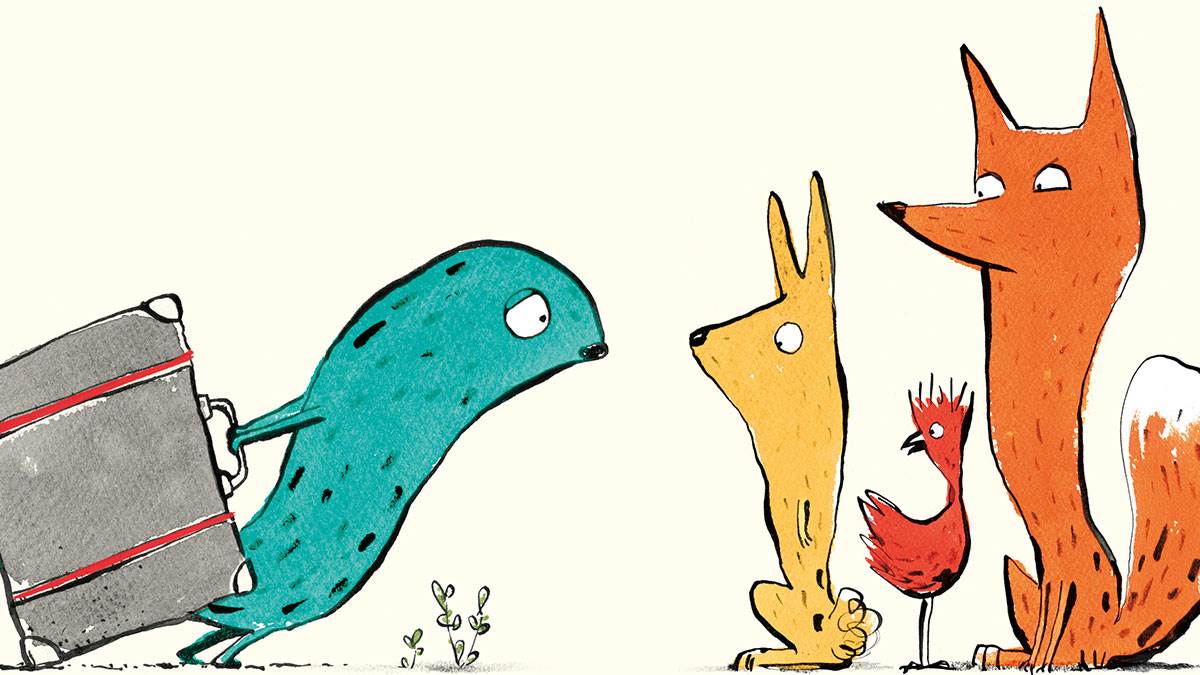‘The Suitcase is a book about being more trusting and open – as well as migration’
Published on: 19 June 2019 Author: Chris Naylor-Ballesteros
The Suitcase is a picture book that can be read on many different levels. Its author and illustrator, Chris Naylor-Ballesteros, talks about the kindness and tolerance that he hopes is there underneath this engaging story.
 Illustration by Chris Naylor-Ballesteros
Illustration by Chris Naylor-Ballesteros
When I started work on what would become The Suitcase, I had a different kind of book in mind.
I was trying to follow in the footsteps of my previous two books (I’m Going To Eat This Ant and I Love You, Stick Insect) – light-hearted and slightly surreal tales featuring animals with lively imaginations that confuse reality and fantasy to (hopefully) comedic effect. The first of these was based on food, and the second based on love or companionship. It seemed logical to base a third book on another basic human need – ie the notion of home or shelter.
What happened was that the funny ideas weren’t really working and I was stuck. At the time, as now, there were lots of media reports of building walls and of border patrols, of capsized boats and container-loads of hidden passengers. And lots of fear-mongering about the immigrant "influx" and "crisis".
But it seemed to me that the crisis wasn’t happening to us, it wasn’t our crisis. We, for the most part, have fairly stable, peaceful lives. The crisis was in their lives – those who had to leave their homes and take a dangerous journey to an unknown destination. And had to hope for safe refuge and help on their eventual arrival.
When friendship blossoms
I’m not qualified to write a story about migration. I don’t know enough about the reasons for taking flight or the fear and hardship that shadows those that flee. But I could imagine how people reacted to these arrivals, the different instincts that are provoked. That’s something that everyone – child or grown-up – can feel familiar with.
I wanted to show that it might not always be easy to allow ourselves to accept someone or something unexpected, different and unknown that changes the status quo and makes us rethink and re-evaluate our place and our relationships. I tried to show that we might make mistakes and disagree and get things wrong.
The "stranger" in this story seems to confound reality and fantasy just like the characters in my previous books. He claims incredible things that just don’t seem possible. The group that confronts him are confused. Is he lying? Or is he just tired and homesick?
Distrust and disagreement leads them to do something unacceptable, but they then realise that they made a mistake and ought to make amends. They begin to understand that the stranger deserves their trust and needs their help and, in their own way, do what they can for him. Even though we might mistrust or be wary of someone at first and are even unkind to them, if we acknowledge our mistakes and try to redeem our actions then perhaps things might just work out and friendship can blossom.
Look inside The Suitcase





The Suitcase by Chris Naylor-Ballesteros
Image 1 of 5
The Suitcase by Chris Naylor-Ballesteros
Image 2 of 5
The Suitcase by Chris Naylor-Ballesteros
Image 3 of 5
Looking at how The Suitcase was made: words and illustrations by Chris Naylor-Ballesteros
Image 4 of 5
Looking at how The Suitcase was made: words and illustrations by Chris Naylor-Ballesteros
Image 5 of 5
Rejecting fearful emotions
It can be difficult to get ideas like this across to very young readers without it feeling preachy or having a dreaded "message" hanging over the book but the most important thing for me was a good story and characters that we care about. That's what you have to follow when you're trying to think them up.
As such, The Suitcase isn't necessarily specific to migration, but could represent any situation in which a new arrival causes some kind of upset, however minor it may be. Though the story can clearly be interpreted as the tale of a migrant’s arrival, similar situations can arise in everyday life too, whether it's an unexpected new pupil at school or family in our street.
Our instincts might be conflicted and they are sometimes closer to the surface when we are young. I wanted to acknowledge that fact and show that maybe if we recognise and reject those fearful emotions, and instead allow ourselves to be more trusting and more open, great things might happen – even if it’s just sharing a cup of tea together.
See books about refugees and asylum seekers for younger children
Topics: 2-3 years, 4-5 years, 6-8 years, Picture book, Immigration, Moving home, Refugees/asylum, Features






Add a comment